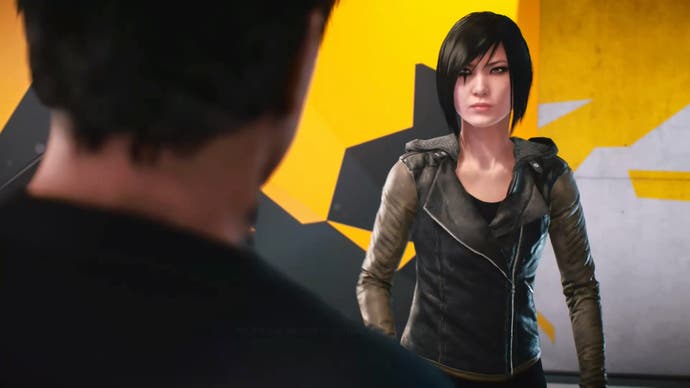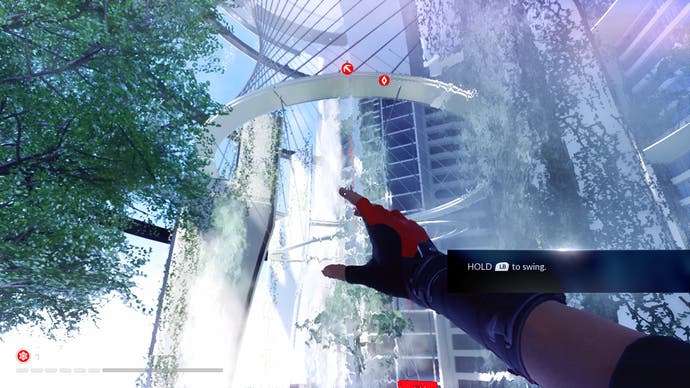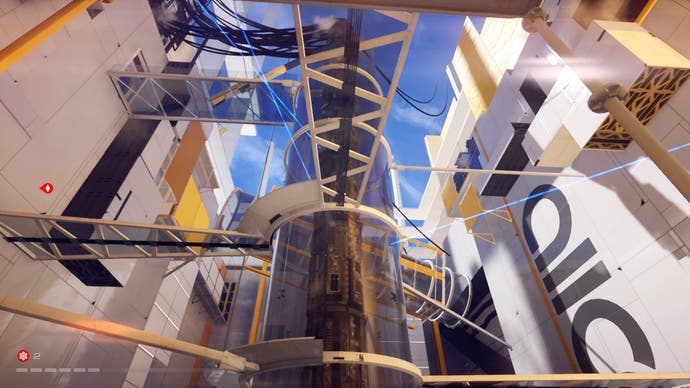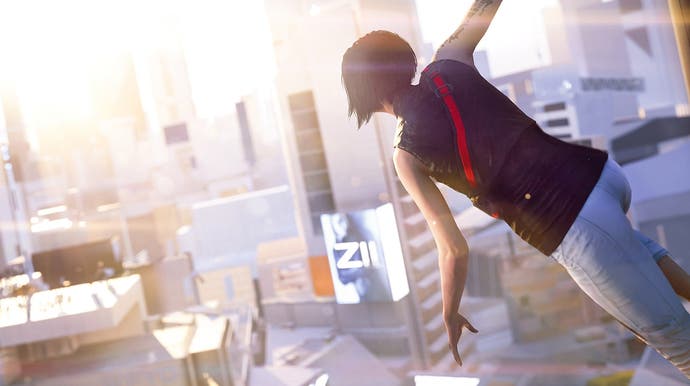Don't gush: why the vision of Mirror's Edge Catalyst makes it a modern great
Feminism and futurism are at one.
Nostalgia and expectations are both saviours and dangers for the gaming industry, sometimes simultaneously. For example, Nintendo is bouncing back thanks to their trusted mascots and a new console, yet somehow every game in existence is being remastered except for Burnout 3. Mirror's Edge Catalyst has arguably been the greatest victim of bloated expectations in contemporary gaming.
The first game made its debut in 2008, promising a futuristic cityscape where stylistic parkour gets you around and traditionally animated cutscenes help out in the story department. Critical reception was good, but far from excellent, yet a cult following developed and a few million copies were shipped. Fast-forward to 2016, the prequel-remake hybrid Catalyst received a similar response, both in terms of sales and reviews. Keep in mind, both Mirror's Edge games received virtually no marketing compared to other blockbusters such as Call of Duty or Legend of Zelda, particularly Catalyst. But how the heck was EA meant to market this?
Firstly, it doesn't look like the grey sludge of other action games. The skies of the fictional city Glass are dominated by superstructures with clean lines and splashes of colour. Sci-fi dystopias never look this good, and it would be ludicrous of me not to say this is gaming's equivalent of Blade Runner, the Fifth Element or any other portrayal of the future that's courageously critiqued by the rest of us mere mortals. Yet playing through the game, it is admittedly a safe story that somehow makes it feel restrained, as if the game's greater potential was left unrealised.
In Catalyst, you follow Faith Connors, a young woman embedded in the world of free-running as a courier. She's just come out of prison but wants to avoid the prying eyes of totalitarian government surveillance while finding out about her family's past.

And it's these themes of technology and humanity that propel Catalyst as one of gaming's greats. Just think about it: it's often solely gameplay that people value most in the best games ever made. That's not to say Catalyst isn't fun to play. It reminded me of 2008's Prince of Persia, as a few key buttons are all that's required to traverse the towers of Glass and zipline great distances like a superhero, which feels incredibly satisfying. This contrasts nicely with the subdued and hypnotising soundtrack. But you usually have to dive deep into the thriving indie scene to play experiences that actually say something about our world, such as Papers, Please or Orwell.
In this world, government surveillance is not only common but an oppressive standard through the controlling corporatocracy of the Conglomerate. Think of Amazon at its end goal: running everything, presumably with Prime services as an extra. Citizens wear wristbands and other trackers that monitor their behaviour and activities, with two people no longer able to meet privately. If you're sat thinking, "Pssht, this sounds kinda extreme dude," don't forget about China's thoroughly well-thought-out and sinister social credit system, or America's upcoming plan to ask for broad social media histories for visa entrants. Nefarious use of social media is already happening here and abroad, and we know this thanks to recent revelations regarding online networks and ads being manipulated for political purposes.
Faith's quest is made all the more complicated due to the sudden disappearance of Noah, a father figure who looked after Faith after her parents' death early in the story. It's also because she steals sensitive data from the headquarters of Kruger Security, the private, militarised police force that's subdued even any hint of public and political dissent.

Without Noah, Faith's left on her own to help navigate the dangerous situation in which she finds herself. She negotiates her way through an underground network of fellow rebellious free-runners, exchanging her skills for protection from Rebecca, the leader of this radical Black November group. Faith also has the help of two friends, Plastic, a resourceful hacker who's always multiple steps ahead of the government's vast surveillance network, and Nomad, a fellow runner whose complimentary hints at deeper feelings for Faith are brushed off assertively with her phrase, "don't gush".
With Faith, Plastic and Rebecca as a trio of resolute, intelligent and capable women featured here, we can forgive ourselves for not realising just how abnormal it is for a major studio to produce a game with a strong feminist identity at its core. This is even stranger because of Faith's east Asian and mixed background, given our world's innate reaction to visualising cyberpunk dystopias with Caucasian characters by default. Having the odd female or non-white side-character used to be the only stretch designers managed in gaming days gone by.
Despite the strong female showing, a later sidequest reveals something somehow even more sinister than the ubiquitous monitoring of Glass' citizens. Faith has to help a woman who quickly mentions having to go through a forced marriage based on her family's finances for the good of business. It's unheard of for a game to comment on society like this, quietly telling us that whatever progress can be seen from the surface of the future, economic might still controls civilisation, particularly women.

I guess this is why developers DICE chose to name the main character Faith. Just as our society rewards workaholics and values money above all else, I love the symbolism of the name and how it acts as a link for us to care so deeply about our endangered protagonist.
Even if you separate all of these inner ideas at work, just the basic premise of Catalyst as a game is an interesting experiment. You're in a true first-person view, limbs occasionally coming into sight as you run, roll and jump through this colourful dystopia as a young no-shit-taking woman whose parkour skills are already legendary. Seeing life aimlessly continue below like this from above is somewhat reassuring, as if the world's problems can only be conquered high above in a state of always-moving, athletic meditation.
Faith is also never objectified or hyper-sexualised like many female characters in the media. Combined with the design's discreet social commentary, Mirror's Edge Catalyst provides a feminist hero that's part of the gaming industry's continuous trajectory towards greater maturity. Ultimately, this risk is fruitful as it provides us with the best portrayal yet of our dark future, and for all this to appear from a triple-A title will remain a brave decision for years to come, just like the original.









